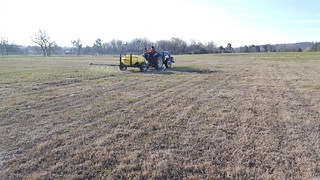Options available when missing early weed control window in bermudagrass pastures
March 30, 2018
Options available when missing early weed control window in bermudagrass pastures
Fast Facts:
- Spring is weed control time in warm season pastures
- There are options for those who miss the window
- Longterm, aim for consistency in weed control
(325 words)
PHOTO available for Download: https://www.flickr.com/gp/uacescomm/huN45W
FAYETTEVILLE, Ark. — The optimum window for weed control in bermudagrass pastures is January through March, but if you’ve missed that window, there are options available.

Division of Agriculture photo by Dirk Philipp
Dirk Philipp, associate professor of animal science and forage researcher for the University of Arkansas System Division of Agriculture, said bermudagrass begins to green up between March and April, depending on its location in the state. “So January through March is high time to tackle weed control,” he said.
Common early-season weeds in Arkansas include henbit, plantain, buttercup and some grassy weeds like little barley and annual ryegrass.
Weeds in dormant bermudagrass pasture can be controlled with glyphosate, Philipp said, though glyphosate is not as effective with some weeds. These include henbit and plantain.
“These need to be controlled with a 2, 4-D related product,” Philipp said.
Some herbicides can be mixed together to increase effectiveness, Philipp said. “Check the labels thoroughly to make sure there are no restrictions,” he said.
Philipp added that surfactants should also be added to the mix so herbicides stick to the waxy surfaces on the leaves of some weeds.
Philipp said producers who miss the early weed control will have later opportunities:
- Bermudagrass is relatively insensitive to glyphosate if applied up to one week after harvest. This should be done only if necessary, Philipp said.
- Many available broadleaf herbicides will take care of broadleaf weeds at any time during the growing season.
- If the first cut of bermudagrass is not especially important to the producer, some weed control can be achieved with that cut. Subsequent cuts are usually cleaner anyway, Philipp said.
In the longterm, Philipp said, producers should try to be consistent with weed control.
“Try to set aside time very early in the year to apply glyphosate while bermudagrass is dormant,” Philipp said.
“Our experience has shown that two years of consistent herbicide application will clean up most weeds,” Philipp said. “Follow up early application with targeted applications to address specific weeds.”
About the Division of Agriculture
The University of Arkansas System Division of Agriculture’s mission is to strengthen agriculture, communities, and families by connecting trusted research to the adoption of best practices. Through the Agricultural Experiment Station and the Cooperative Extension Service, the Division of Agriculture conducts research and extension work within the nation’s historic land grant education system.
The Division of Agriculture is one of 20 entities within the University of Arkansas System. It has offices in all 75 counties in Arkansas and faculty on five system campuses.
Pursuant to 7 CFR § 15.3, the University of Arkansas System Division of Agriculture offers all its Extension and Research programs and services (including employment) without regard to race, color, sex, national origin, religion, age, disability, marital or veteran status, genetic information, sexual preference, pregnancy or any other legally protected status, and is an equal opportunity institution.
By Fred Miller
Arkansas Agricultural Experiment Station
U of A System Division of Agriculture
Media Contact: Fred Miller
Communication Services
U of A Division of Agriculture
(479) 575-5647
fmiller@uark.edu
Related Links